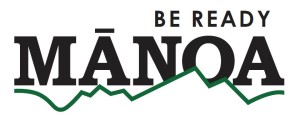Are You Prepared for No Water?
 In the event of a destructive hurricane or tsunami it is possible that water pumping facilities could be damaged or that electrical power necessary to run the pumps would be unavailable. If that happened, water reservoirs would run dry in 2 or 3 days. After hurricane Iniki hit Kauai, some homes were without water for a month. In such an emergency, how would you get water for drinking, cooking, flushing toilets, bathing, doing laundry? Mānoa residents are perhaps more fortunate than those in other areas of the island because we have ample rainfall. Thus it is possible to set up a water catchment system for emergency water needs. How do you do that? Every quarter, the Halawa Xeriscape Garden run by the Board of Water Supply gives a Rain Barrel Catchment class. Recently several members of the WWAP NSW attended the class and came home with a 55 gallon water barrel and the knowledge of how to set up a catchment system. Here is George working on his new water barrel. If you are interested in learning more, call 748-5363 or send an email to workshops@hbws.org to sign up for their next Rain Barrel Catchment class. The cost of the class is $35.
In the event of a destructive hurricane or tsunami it is possible that water pumping facilities could be damaged or that electrical power necessary to run the pumps would be unavailable. If that happened, water reservoirs would run dry in 2 or 3 days. After hurricane Iniki hit Kauai, some homes were without water for a month. In such an emergency, how would you get water for drinking, cooking, flushing toilets, bathing, doing laundry? Mānoa residents are perhaps more fortunate than those in other areas of the island because we have ample rainfall. Thus it is possible to set up a water catchment system for emergency water needs. How do you do that? Every quarter, the Halawa Xeriscape Garden run by the Board of Water Supply gives a Rain Barrel Catchment class. Recently several members of the WWAP NSW attended the class and came home with a 55 gallon water barrel and the knowledge of how to set up a catchment system. Here is George working on his new water barrel. If you are interested in learning more, call 748-5363 or send an email to workshops@hbws.org to sign up for their next Rain Barrel Catchment class. The cost of the class is $35.
